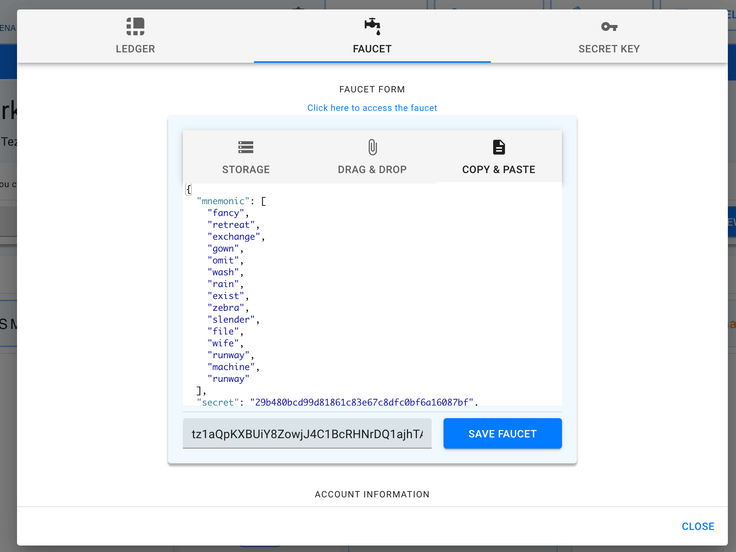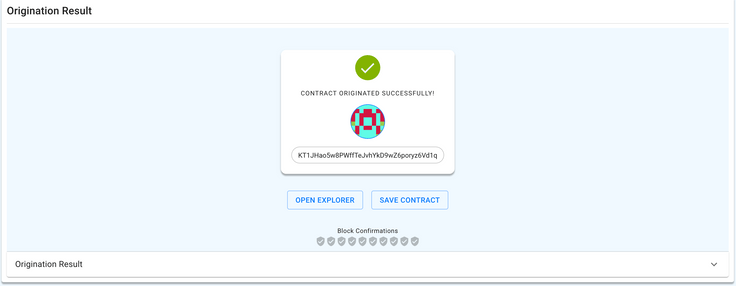SmartPy Exercise - Hands-on Smart Contract Development
A smart contract to certify students
Let us test a more complicated storage structure.
Imagine that at the end of a course, you want to test all the students, and accordingly certify their performance. Let us write the for this purpose needed basic smart contract together.
We begin our thinking with what we want:
- We want to maintain a list of students, which passed the exam and thereby are certified;
- We want to restrict who can change the list so that not everybody can do so.
Let us start with the former: How could we represent students? The easiest would be to work with a list:
import smartpy as sp
class Certification(sp.Contract):
def __init__(self):
self.init(certified=[])
@sp.entry_point
def certify(self, params):
self.data.certified.push(params)
@sp.add_test(name = "Certify")
def test():
contract= Certification()
scenario = sp.test_scenario()
scenario+=contract
scenario+=contract.certify("Anil Oener")
scenario+=contract.certify("Ibo Sy")Ok, we can see how the list is growing in the output when we add new students with the help of the "certify" function:

You can see how SmartPy understands that we want to use a List without explicit typing.
Currently, we have two issues:
- Everyone can invoke this smart contract, and expand the list of certified students;
- It could be that two students have the same name.
We can solve the first quite simply by using sp.verify:
import smartpy as sp
class Certification(sp.Contract):
def __init__(self):
self.init(certified=sp.list(t=sp.TString), certifier=sp.address("tz1W4W2yFAHz7iGyQvFys4K7Df9mZL6cSKCp"))
@sp.entry_point
def certify(self, params):
sp.verify(sp.sender==self.data.certifier)
self.data.certified.push(params)
@sp.add_test(name = "Certify")
def test():
contract= Certification()
scenario = sp.test_scenario()
scenario+= contract
scenario+= contract.certify("Anil Oener").run(sender=sp.address("tz1W4W2yFAHz7iGyQvFys4K7Df9mZL6cSKCp"))
scenario+= contract.certify("Ibo Sy").run(sender=sp.address("tz1W4W2yFAHz7iGyQvFys4K7Df9mZL6cSKCp"))Or better testing with test_account:
import smartpy as sp
class Certification(sp.Contract):
def __init__(self, certifier):
self.init(certified=sp.list(t=sp.TString), certifier=certifier.address)
@sp.entry_point
def certify(self, params):
sp.verify(sp.sender==self.data.certifier)
self.data.certified.push(params)
@sp.add_test(name = "Certify")
def test():
anil= sp.test_account("Anil")
ibo= sp.test_account("Ibo")
contract= Certification(certifier=anil)
scenario= sp.test_scenario()
scenario+= contract
scenario+= contract.certify("Anil Oener").run(sender=anil)
scenario+= contract.certify("Ibo Sy").run(sender=anil)We expanded our storage and saved an address that represents the certifier. Now, if a different address tries to add to the list,
sp.verify(sp.sender==self.data.certifier)It will lead to an invalid transaction.
A common existing verification in smart contract writing is: What address does this smart contract call? In SmartPy, we have access to the address via sp.sender.
Now, we can tackle the second issue.
We need a unique identifier for the students. The most simple and obvious solution would be the use of the student's Tezos address as a unique identifier. For this, a map is perfectly suited:
import smartpy as sp
class Certification(sp.Contract):
def __init__(self, certifier):
self.init(certified=sp.map(tkey=sp.TAddress, tvalue=sp.TString), certifier=certifier.address)
@sp.entry_point
def certify(self, params):
sp.verify(sp.sender==self.data.certifier)
self.data.certified[params.address]= params.name
@sp.add_test(name = "Certify")
def test():
anil = sp.test_account("Anil")
ibo = sp.test_account("Ibo")
contract= Certification(certifier=anil)
scenario = sp.test_scenario()
scenario+= contract
scenario+= contract.certify(name= anil.seed, address= anil.address).run(sender=anil)
scenario+= contract.certify(name= ibo.seed, address= ibo.address).run(sender=anil)In other words, our storage can be described as:
Storage:
{
certified: sp.TMap(sp.TAddress, sp.TString);
certifier: sp.TAddress;
}.layout(("certified", "certifier"))
Entrypoints:
| certify
{
address: sp.TAddress;
name: sp.TString;
}.layout(("address", "name"))And again we see how the list is growing:

Finally, we want to use a big_map instead of a map:
import smartpy as sp
class Certification(sp.Contract):
def __init__(self, certifier):
self.init(certified=sp.big_map(tkey=sp.TAddress, tvalue=sp.TString), certifier=certifier.address)
@sp.entry_point
def certify(self, params):
sp.verify(sp.sender==self.data.certifier)
self.data.certified[params.address]= params.name
@sp.add_test(name = "Certify")
def test():
Anil = sp.test_account("Anil")
Ibo = sp.test_account("Ibo")
Contract= Certification(certifier=Anil)
scenario = sp.test_scenario()
scenario+=Contract
scenario+=Contract.certify(name= Anil.seed, address= Anil.address).run(sender=Anil)
scenario+=Contract.certify(name= Ibo.seed, address= Ibo.address).run(sender=Anil)Deploying with SmartPy
SmartPy allows us to deploy the smart contract directly within the browser.
First, we can again import an account from the faucet:

Now we need to activate and reveal this account before we can deploy our contract:

Afterward, we can deploy the smart contract:

and check via the explorer:

Notice that we want to work on the test network and therefore we need to pick up a node participating in the test network:
